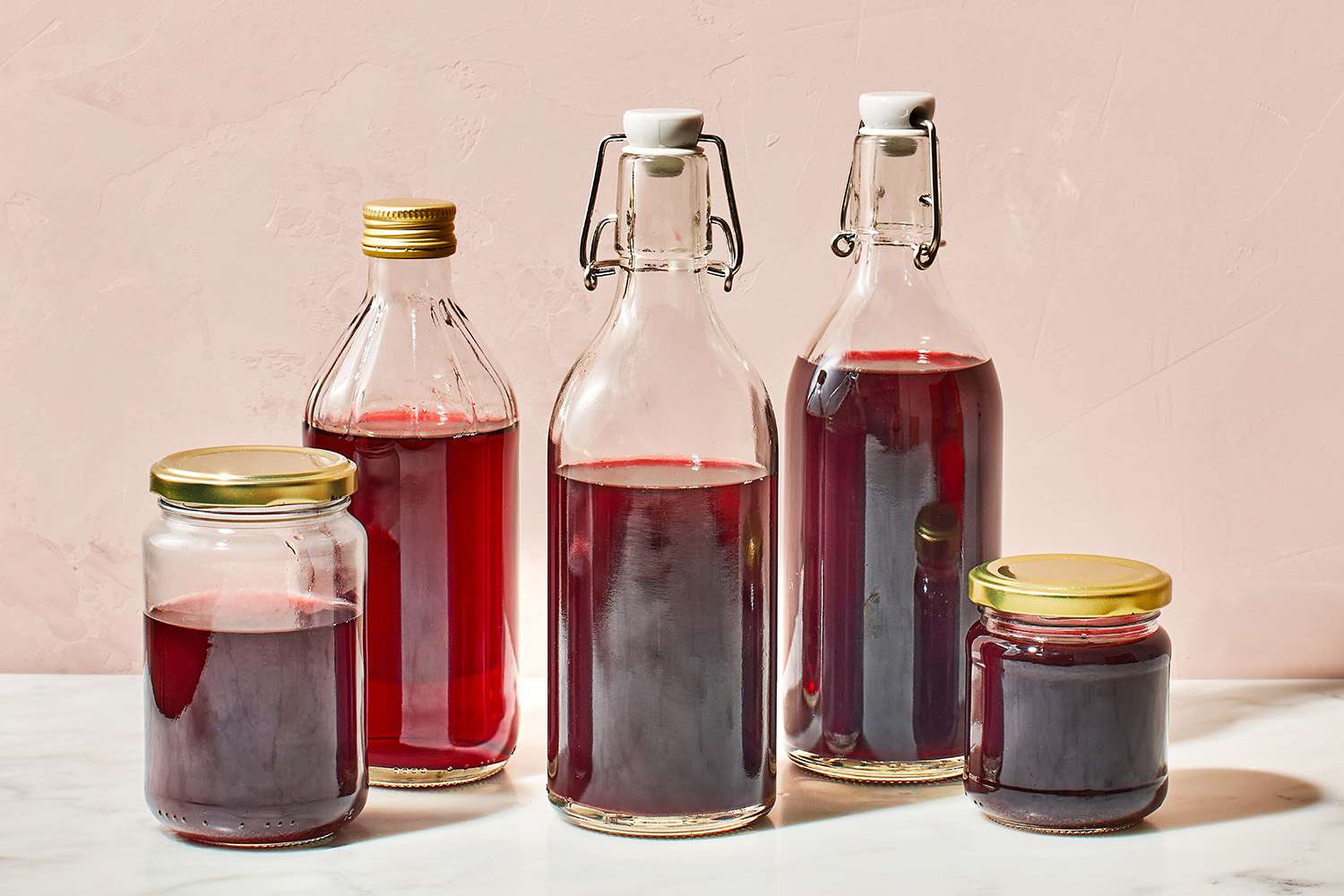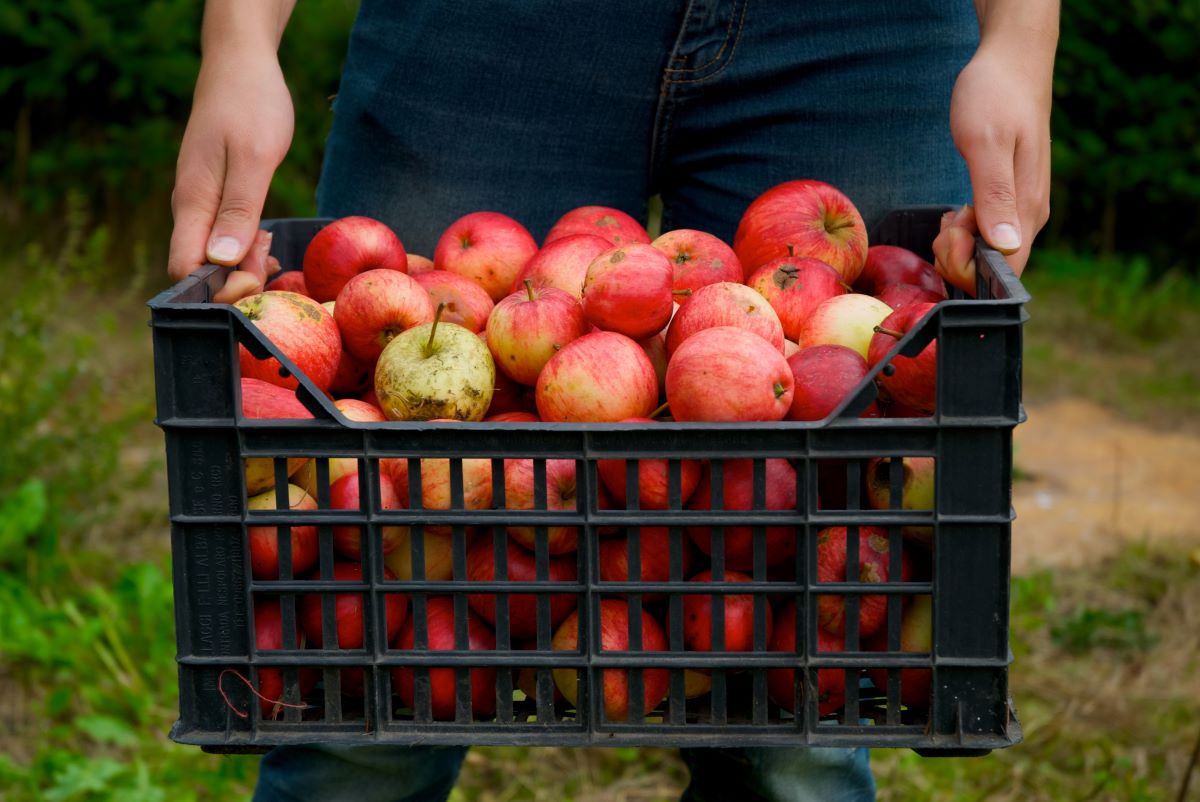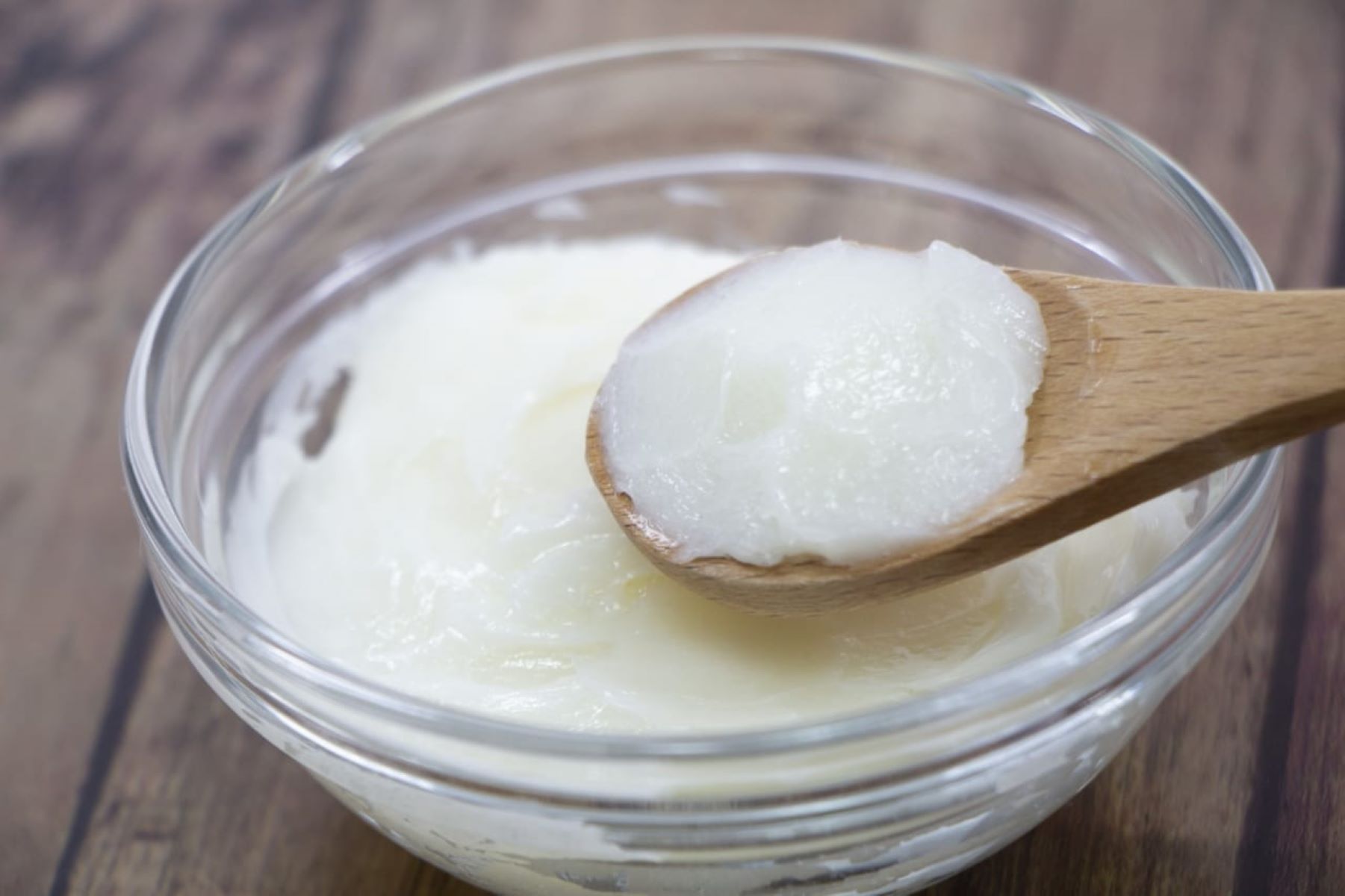Home>Articles>How To Store Apple Cider Vinegar After Opening


Articles
How To Store Apple Cider Vinegar After Opening
Modified: December 7, 2023
Learn the best practices for storing apple cider vinegar after opening in this informative article. Ensure the longevity and quality of your vinegar with these expert tips.
(Many of the links in this article redirect to a specific reviewed product. Your purchase of these products through affiliate links helps to generate commission for Storables.com, at no extra cost. Learn more)
Introduction
Welcome to the world of apple cider vinegar! This tangy and versatile ingredient has gained immense popularity over the years due to its numerous health benefits and culinary uses. With its strong, distinctive flavor and various potential applications, apple cider vinegar has become a pantry staple for many households.
Once you open a bottle of apple cider vinegar, it’s crucial to store it properly to maintain its quality and potency. In this article, we will explore the importance of storing apple cider vinegar correctly after opening and provide you with some best practices to ensure its freshness and longevity.
But first, let’s understand why it’s essential to pay attention to proper storage methods for apple cider vinegar.
Key Takeaways:
- Properly storing apple cider vinegar after opening is crucial to maintain its quality, flavor, and nutritional benefits. Follow best practices to ensure freshness and longevity, saving money and enjoying its tangy goodness.
- Check for spoilage signs before using apple cider vinegar to guarantee high-quality consumption. Proper storage methods preserve its freshness, flavor, and potency, enhancing culinary creations and health benefits.
Why is it important to store apple cider vinegar properly?
Proper storage of apple cider vinegar is crucial to maintain its quality, taste, and health benefits. Here are the reasons why it’s important to store it properly:
- Prolong Shelf Life: By storing apple cider vinegar correctly, you can extend its shelf life and prevent it from spoilage. The high acidity of apple cider vinegar helps to inhibit the growth of harmful bacteria and preserve its freshness over an extended period.
- Retain Nutritional Value: Apple cider vinegar is known for its numerous health benefits, including being rich in antioxidants and containing beneficial enzymes. Proper storage ensures that these nutrients are preserved, allowing you to reap the full nutritional benefits when consuming it.
- Maintain Flavor and Aroma: The flavor and aroma of apple cider vinegar can be affected by improper storage. Exposure to heat, light, and air can cause the vinegar to oxidize and develop a rancid or off-putting taste. By storing it properly, you can maintain its original flavor and enjoy its full potential in your recipes.
- Prevent Contamination: Storing apple cider vinegar in a hygienic manner helps prevent contamination by bacteria, mold, or other microorganisms. This is especially important if you use the vinegar for various purposes like cooking, cleaning, or as a natural remedy.
- Cost-Effective: Proper storage of apple cider vinegar prevents spoilage and the need for frequent repurchasing, saving you money in the long run. When stored correctly, you can maximize its usage and avoid unnecessary waste.
Now that we understand the importance of proper storage, let’s explore the best practices for storing apple cider vinegar after opening.
Best practices for storing apple cider vinegar after opening
To ensure the freshness and longevity of your apple cider vinegar after opening, follow these best practices for storage:
- Store in a cool, dry place: The ideal storage location for apple cider vinegar is in a cool, dry pantry or cupboard away from direct sunlight and sources of heat. Exposure to heat and sunlight can degrade the quality of the vinegar and affect its flavor.
- Refrigerate apple cider vinegar: While it’s not necessary, refrigerating apple cider vinegar can help prolong its shelf life. If you live in a warm climate or prefer to keep your vinegar chilled, storing it in the refrigerator is a good option. However, refrigeration may cause the vinegar to appear cloudy or develop sediment. This is harmless and does not affect its quality.
- Use airtight containers or bottles: Transfer the apple cider vinegar to an airtight container after opening. This helps to prevent air exposure and maintain its freshness. Glass bottles with tight-fitting lids or containers made of food-safe plastic work well for storing vinegar.
- Avoid exposure to sunlight and heat: As mentioned earlier, apple cider vinegar is sensitive to heat and sunlight. Therefore, avoid storing it near the stove, oven, or any other heat source. Also, make sure to keep it away from windows or areas that receive direct sunlight.
- Check for spoilage signs before using: Before using apple cider vinegar, check for any signs of spoilage. These may include a strong off-putting odor, mold growth, or a significant change in color or clarity. If you notice any of these signs, it’s best to discard the vinegar and get a fresh bottle.
By following these best practices, you can ensure that your apple cider vinegar remains fresh, flavorful, and ready to enhance your culinary creations or provide you with its health benefits.
Now that you know how to store apple cider vinegar after opening, you can enjoy its tangy goodness for an extended period while maintaining its quality.
Option 1: Store in a cool, dry place
One of the simplest and most effective ways to store apple cider vinegar after opening is to keep it in a cool, dry place. This option is particularly suitable if you have a pantry or cupboard that meets the criteria.
When choosing a storage location, aim for an area that maintains a consistent temperature and is away from direct sunlight and sources of heat like stoves or ovens. Heat and sunlight can accelerate the vinegar’s oxidation process and degrade its quality over time.
A cool, dry place helps preserve the flavor, nutritional value, and potency of the apple cider vinegar. It also helps prevent the growth of harmful bacteria or mold that can spoil the liquid.
Ensure that the vinegar is tightly sealed and stored in a glass or plastic container with a secure lid. This will further protect it from exposure to air and maintain its freshness.
By following this option, you’ll have easy access to your apple cider vinegar, and it will remain in optimal condition for an extended period.
However, keep in mind that if you live in a region with high humidity or if your pantry tends to get warm, you might need to consider refrigerating the apple cider vinegar instead.
Now, let’s move on to option 2: refrigerating apple cider vinegar.
Option 2: Refrigerate apple cider vinegar
If you prefer to extend the shelf life of your apple cider vinegar or live in a warm climate, refrigeration is a great option. While it’s not necessary, refrigerating your vinegar can help maintain its freshness and potency.
When refrigerating apple cider vinegar, it’s important to transfer it to a tightly sealed container to prevent any odors or flavors from seeping in. A glass jar or bottle with a secure lid is the best choice. Make sure to label the container with the date of opening, as it can help you keep track of its freshness.
It’s normal for refrigerated apple cider vinegar to develop a slightly cloudy appearance or sediments at the bottom. This is caused by the chilled temperature and doesn’t impact the vinegar’s quality or taste. Simply give the bottle a gentle shake before using to redistribute any sediments.
Refrigeration helps slow down the fermentation process in the vinegar, allowing it to retain its flavor and nutritional content for a longer period. It also helps inhibit the growth of bacteria or mold, further preserving its freshness.
However, it’s essential to note that refrigerated apple cider vinegar may have a slightly thicker consistency than when stored at room temperature. This change is normal and will not affect its usability or taste.
Lastly, while refrigeration is a great option for maintaining the vinegar’s quality, it’s important to bring it back to room temperature before using it in your recipes. This allows the flavors to fully develop and ensures optimal taste.
Now that you’ve learned about storing apple cider vinegar in a cool, dry place and refrigerating it, let’s explore option 3: using airtight containers or bottles.
Store apple cider vinegar in a cool, dark place, away from direct sunlight and heat sources. Keep it tightly sealed to prevent oxidation and maintain its quality.
Read more: How To Store Apple Cider Vinegar
Option 3: Use airtight containers or bottles
Using airtight containers or bottles is an excellent way to store apple cider vinegar after opening. This option helps protect the vinegar from exposure to air, which can lead to deterioration and loss of flavor over time.
When choosing a container, opt for one made of glass or food-safe plastic that has a tight-fitting lid. Airtight containers prevent air from entering and ensure that the vinegar remains fresh and potent.
Transferring the apple cider vinegar to an airtight container right after opening is crucial. It allows you to seal the vinegar tightly and minimize air contact, preserving its quality and preventing oxidation.
Make sure to clean and dry the container thoroughly before pouring in the vinegar to avoid any contamination. Label the container with the date of opening to help keep track of its freshness.
Since airtight containers can come in various sizes, select a size that suits your usage. If you tend to use apple cider vinegar frequently, consider using smaller bottles that you can easily finish within a reasonable time frame to ensure maximum freshness.
Remember to store the airtight containers in a cool, dry place away from direct sunlight and sources of heat to maintain the vinegar’s quality. This storage method will help you preserve the flavor and nutritional benefits of the apple cider vinegar for an extended period.
Now that you’ve explored the option of using airtight containers or bottles, let’s move on to option 4: avoiding exposure to sunlight and heat.
Option 4: Avoid exposure to sunlight and heat
Avoiding exposure to sunlight and heat is a crucial consideration when storing apple cider vinegar after opening. The vinegar’s quality and flavor can be negatively affected by prolonged exposure to these elements, leading to a decrease in its overall freshness.
Sunlight contains ultraviolet (UV) rays that can accelerate the oxidation process of apple cider vinegar. This can result in a loss of flavor and nutritional value. To prevent this, store the vinegar in a dark area such as a pantry or cupboard, away from windows or any other sources of direct sunlight.
Heat is another factor that can adversely affect apple cider vinegar. High temperatures can lead to the degradation and spoilage of the vinegar. Avoid storing it near stoves, ovens, or any other heat-generating appliances. Instead, choose a cool and dry location to maintain its quality.
Keep in mind that fluctuations in temperature can also impact the vinegar. Therefore, it’s important to store it in a place where the temperature remains relatively stable. Extreme temperature changes can result in the expansion and contraction of the vinegar, potentially compromising its seal or causing the bottle to leak.
Additionally, using dark-colored bottles can provide an extra layer of protection against sunlight. Consider transferring your apple cider vinegar to amber or dark brown glass bottles, as they inhibit UV rays from penetrating and potentially damaging the vinegar.
By avoiding exposure to sunlight and heat, you can significantly prolong the shelf life and maintain the quality of your apple cider vinegar, ensuring that it remains fresh and full of flavor for a longer period.
Now that you’ve learned about the importance of avoiding sunlight and heat, let’s explore option 5: checking for spoilage signs before using.
Option 5: Check for spoilage signs before using
Prior to using apple cider vinegar, it’s important to conduct a quick inspection to ensure that the vinegar is still in good condition. Checking for spoilage signs helps prevent any potential health risks and guarantees that you’re consuming high-quality vinegar.
Here are some spoilage signs to watch out for:
- Off-putting odor: If the vinegar emits a strong, unpleasant smell, it could be an indication of spoilage. Fresh apple cider vinegar typically has a tangy aroma, so any distinctive or foul odor should raise concerns.
- Mold growth: Inspect the surface of the vinegar for the presence of any mold. Mold growth can significantly alter the quality of the vinegar and should be avoided. If you notice any mold, it’s best to discard the vinegar immediately.
- Color and clarity: Apple cider vinegar should typically have a clear to slightly hazy appearance. If you notice a significant change in color, such as excessive cloudiness or unusual sediment, it could be a sign of spoilage.
- Funky taste: Give the vinegar a taste test before using it. It should have a tangy, acidic flavor representative of apple cider vinegar. If you detect any off flavors or a rancid taste, it’s best to dispose of the vinegar.
By checking for these spoilage signs, you can ensure that the apple cider vinegar is safe to use and will enhance your recipes or provide the desired health benefits.
It’s worth noting that apple cider vinegar has a long shelf life, and if stored properly, it can remain in good quality for an extended period. However, it’s always better to be cautious and perform these checks to avoid any unpleasant experiences.
Now that you’ve learned about the importance of checking for spoilage signs, it’s time to wrap up and summarize what we’ve covered.
Conclusion
Properly storing apple cider vinegar after opening is essential to maintain its quality, flavor, and nutritional value. By following best practices, you can ensure that your apple cider vinegar remains fresh and potent for an extended period.
Storing apple cider vinegar in a cool, dry place away from sunlight and heat is the simplest method. It helps prevent oxidation and maintains the vinegar’s freshness. Alternatively, refrigerating the vinegar can further prolong its shelf life, especially in warm climates.
Using airtight containers or bottles is another effective option. This helps protect the vinegar from exposure to air, preserving its quality and preventing oxidation.
Avoiding exposure to sunlight and heat is crucial. These elements can degrade the quality of the vinegar, impacting its flavor and potency. Storing it in a dark area and choosing dark-colored bottles can provide additional protection against sunlight.
Prior to using apple cider vinegar, always check for spoilage signs, such as off-putting odor, mold growth, changes in color or clarity, and funky taste. This simple step ensures that you’re consuming high-quality vinegar and helps to prevent any health risks.
By following these best practices, you can enjoy the tangy goodness and numerous benefits of apple cider vinegar in your culinary creations, home remedies, or cleaning routines.
Remember, proper storage not only maintains the quality of the vinegar but also saves you money by reducing waste and ensuring its longevity. So, take care of your apple cider vinegar and savor its distinct flavor in all your favorite recipes.
Now go forth and store your apple cider vinegar with confidence, knowing that it will be fresh and ready for use whenever you need it!
Frequently Asked Questions about How To Store Apple Cider Vinegar After Opening
Was this page helpful?
At Storables.com, we guarantee accurate and reliable information. Our content, validated by Expert Board Contributors, is crafted following stringent Editorial Policies. We're committed to providing you with well-researched, expert-backed insights for all your informational needs.















0 thoughts on “How To Store Apple Cider Vinegar After Opening”